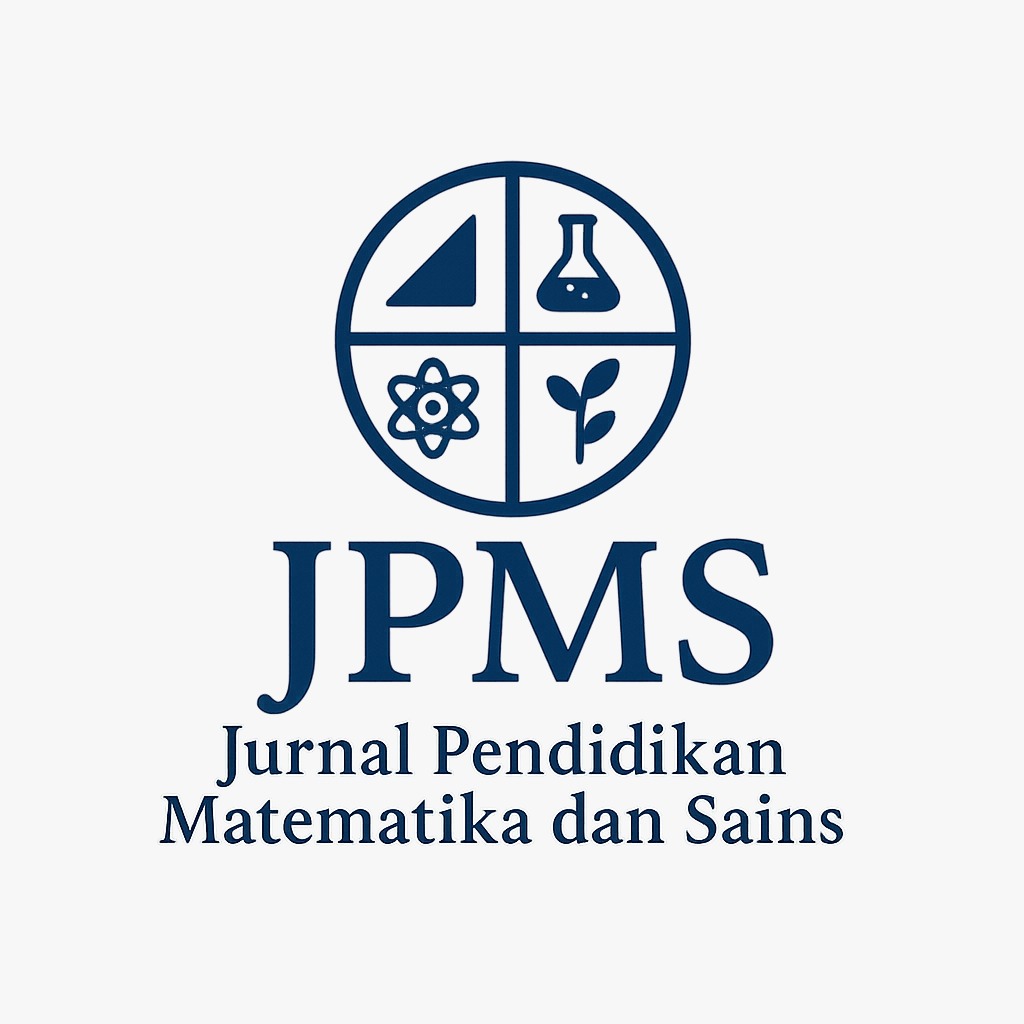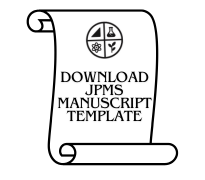Improving Students' Performance on the Use of the Microscope through Demonstration Method
DOI:
https://doi.org/10.21831/jpms.v12i2.76695Keywords:
Biology teachers Demonstration method, Microscope, Students, Teacher traineesAbstract
References
Ackerman, D. (2020). Engaging the Five Senses. The Handbook of Wellness Medicine, 448. https://doi.org/10.1017/9781108650182.037
Aikenhead, G. S. (2023). Humanistic school science: Research, policy, politics and classrooms. Science Education, 107(2), 237-260. https://doi.org/10.1002/sce.21774
Akram, H., Abdelrady, A. H., Al-Adwan, A. S., & Ramzan, M. (2022). Teachers' perceptions of technology integration in teaching-learning practices: A systematic review. Frontiers in psychology, 13, 920317. 10.3389/fpsyg.2022.920317
Armstrong, T. (2006). The best schools: How human development research should inform educational practice. Association for Supervision and Curriculum Development.
Ayo, V. A., & Ahmed, F. M. (2023). Implementation of Science Curriculum in Nigerian Tertiary Education: Problems and Way Forward. International Journal on Integrated Education(IJIE), 6(4), 22-31. https://doi.org/10.17605/ijie.v6i4.4221
Barkley, E. F., & Major, C. H. (2020). Student engagement techniques: A handbook for college faculty. HobokenJohn Wiley & Sons.
Bartlett, L., & Mogusu, E. (2013). Teachers' understandings and implementation of learner-centered pedagogy. In Teaching in Tension (pp. 61-74). 10.1007/978-94-6209-224-2_4
Bdiwi, R., de Runz, C., Faiz, S., & Ali-Cherif, A. (2019). Smart learning environment: Teacher's role in assessing classroom attention. Research in Learning Technology, 27. https://doi.org/10.25304/rlt.v27.2072
Bisen, P. S., Debnath, M., & Prasad, G. B. (2012). Microbes: concepts and applications. John Wiley & Sons. https://doi.org/10.1002/9781118311912.index
Bremner, N. (2019). From learner-centred to learning-centred: Becoming a "˜hybrid'practitioner. International Journal of Educational Research, 97, 53-64. https://doi.org/10.1016/j.ijer.2019.06.012
Bryk, A. S., Greenberg, S., Bertani, A., Sebring, P., Tozer, S. E., & Knowles, T. (2023). How a city learned to improve its schools. Cambrdge, United States: Harvard Education Press.
Cicekci, M. A., & Sadik, F. (2019). Teachers' and Students' Opinions about Students' Attention Problems during the Lesson. Journal of Education and Learning, 8(6), 15-30. https://doi.org/10.5539/jel.v8n6p15
Clement, I., Bello, M., & Sunusi, S. A. (2017). Science education and Nigeria national development effort: The missing link. International Journal of Education and Evaluation, 3(5), 46-56. Retrieced from https://www.iiardjournals.org/get/IJEE/VOL.%203%20NO.%205%202017/SCIENCE%20EDUCATION.pdf on 09/04//2024
Dorji, P., Gyeltshen, C., Sanyasi, G. D., Sithub, P., Dema, T., & Choden, Y. (2020). The impact of early child care and development education on cognitive, psychomotor, and affective domains of learning. Asian Journal of Education and Social Studies, 29-38. https://doi.org/10.9734/ajess/2020/v12i130303
Doyle, T. (2023). Helping students learn in a learner-centered environment: A guide to facilitating learning in higher education. Abingdon: Taylor & Francis.
Du Plessis, E. (2020). Student teachers' perceptions, experiences, and challenges regarding learner-centred teaching. South African Journal of Education, 40(1). https://doi.org/10.15700/saje.v40n1a1631
Einstein, A. (2023). Teaching students how to learn. Educational Utopias, 227. Retrieved from https://assets.pubpub.org/11rd6fvz/31686042606406.pdf#page=239
Fang, W., Liu, Z., & Putra, A. R. S. (2022). Role of research and development in green economic growth through renewable energy development: empirical evidence from South Asia. Renewable Energy, 194, 1142-1152. https://doi.org/10.1016/j.renene.2022.04.125
Filgona, J., Sakiyo, J., Gwany, D. M., & Okoronka, A. U. (2020). Motivation in learning. Asian Journal of Education and social studies, 10(4), 16-37. : https://doi.org/10.9734/ajess/2020/v10i430273
Frago, R. L., & Janer, S. S. (2020). Effect of demonstration method and laboratory method in enhancing the conceptual understanding of grade ten (10) students in chemistry. International Journal of Engineering Science and Computing, 10(5), 25784-25790. Retrieved from https://www.academia.edu/66541642/Effect_of_Demonstration_Method_and_Laboratory_Method_in_Enhancing_the_Conceptual_Understanding_of_Grade_Ten_10_Students_in_Chemistry on 12/04/2024
Giridharan, K., & Raju, R. (2016). Impact of teaching strategies: demonstration and lecture strategies and impact of teacher effect on academic achievement in engineering education. International Journal of Educational Sciences, 14(3), 174-186. Retrieved from https://api.semanticscholar.org/CorpusID:158499431 on 04/03/2024
Gregory, C. K. K. (2008). An investigation into microbiology students' understanding of microbes (Doctoral dissertation, Durham University).
Havik, T., & Westergí¥rd, E. (2020). Do teachers matter? Students' perceptions of classroom interactions and student engagement. Scandinavian journal of educational research, 64(4), 488-507. https://doi.org/10.1080/00313831.2019.1577754
Heim, A. B., & Holt, E. A. (2019). Benefits and challenges of instructing introductory biology course-based undergraduate research experiences (CUREs) as perceived by graduate teaching assistants. CBE"”Life Sciences Education, 18(3), ar43. https://doi.org/10.1187/cbe.18-09-0193
Hopkins, B. (2023). The restorative classroom: Using restorative approaches to foster effective learning. London: Routledge.
Hourigan, M., & Leavy, A. M. (2023). Elementary teachers' experience of engaging with teaching through problem solving using lesson study. Mathematics Education Research Journal, 35(4), 901-927. https://doi.org/10.1007/s13394-022-00418-w
Huda, M., Taisin, J. N., Muhamad, M., Kiting, R., & Yusuf, R. A. (2023, December). Digital technology adoption for instruction aids: insight into teaching material content. In International Conference on Information and Communication Technology for Competitive Strategies (pp. 59-68). Singapore: Springer Nature Singapore.
Husna, S. M., & Adriani, F. (2023). Analysis of the Application and Correlation of the Murder Type Collaborative Learning Model on Student Learning Outcomes at Senior High School Jambi. Journal Evaluation in Education (JEE), 4(1), 21-30. https://doi.org/10.37251/jee.v4i1.293
Jiji. (2024). Microscope in Ghana. Retrieved from https://jiji.com.gh/302-microscopes on 02/03/2024
Jocz, J. A., Zhai, J., & Tan, A. L. (2014). Inquiry learning in the Singaporean context: Factors affecting student interest in school science. International Journal of Science Education, 36(15), 2596-2618. https://doi.org/10.1080/09500693.2014.908327
Kareem, O. S. (2019). Effects of Demonstration and Project Methods of Teaching on Senior Secondary School Chemistry Students'Achievement In Minna Municipal, Niger State (Doctoral dissertation, Federal University of Technology Minna, Niger State)
London, M., Sessa, V. I., & Shelley, L. A. (2023). Developing self-awareness: Learning processes for self-and interpersonal growth. Annual Review of Organizational Psychology and Organizational Behavior, 10, 261-288. https://doi.org/10.1146/annurev-orgpsych-120920-044531
Mahapatro, B. (2021). Human resource management. New Delhi: New Age International (P) ltd..
Minta E. (2016). Instructional methods. [Unpublished manuscript]. Retrieved from https://mingycomputersgh.wordpress.com/2016/10/19/instructional-methods/ on 29/05/2024.
Mintii, M. M., Sharmanova, N. M., Mankuta, A. O., Palchevska, O. S., & Semerikov, S. O. (2023, October). Selection of pedagogical conditions for training STEM teachers to use augmented reality technologies in their work. In Journal of Physics: Conference Series (Vol. 2611, No. 1, p. 012022). IOP Publishing.
Mtitu, E. A. (2014). Learner-centred teaching in Tanzania: Geography teachers' perceptions and experiences (Doctoral dissertation, Open Access Te Herenga Waka-Victoria University of Wellington).
Muhammad, A. U., Bala, D., & Ladu, K. M. (2016). Effectiveness of Demonstration and Lecture Methods in Learning Concept in Economics among Secondary School Students in Borno State, Nigeria. Journal of Education and Practice, 7(12), 51-59. Retrieved from https://files.eric.ed.gov/fulltext/EJ1099610.pdf on 12/04/2024
Muñoz-Restrepo, A., Ramirez, M., & Gaviria, S. (2020). Strategies to enhance or maintain motivation in learning a foreign language. Profile Issues in TeachersProfessional Development, 22(1), 175-188. https://doi.org/10.15446/profile.v22n1.73733
Noor, N. A. M., Saim, N. M., Alias, R., & Rosli, S. H. (2020). Students' performance on cognitive, psychomotor and affective domain in the course outcome for embedded course. Universal Journal of Educational Research, 8(8), 3469-3474. doi: 10.13189/ujer.2020.080821.
Olatunde-Aiyedun, T. G., & Ogunode, N. J. (2020). School administration and effective teaching methods in science education in north central nigeria. Olatunde-Aiyedun, TG & Ogunode, NJ (2021). School Administration and effective teaching methods in Science Education in Nigeria. International Journal on Integrated Education, 4(2), 145-161. Retrieved from https://papers.ssrn.com/sol3/papers.cfm?abstract_id=3927799 on 06/04/2024
O'Leary, M. (2020). Classroom observation: A guide to the effective observation of teaching and learning. London: Routledge.
Ossei-Anto, T. A. (1999). Management and integration of science resources in Ghana's educational reform programme. Journal of Educational Management, 2(2), 42-66. https://doi.org/10.47963/jem.v2i.370
Pangaribuan, B. W., Purba, N., Siahaan, K. W. A., Sidabutar, E. F., Sihombing, V. T., Simamora, D. F., & Matondang, J. R. (2022). The Implementation of Demonstration Method to Increase Learning Outcome in Natural Science Lessons. Jurnal Obsesi: Jurnal Pendidikan Anak Usia Dini, 6(4), 3680-3692. doi: 10.31004/obsesi.v6i4.1711
Piwowar-Sulej, K. (2021). Human resources development as an element of sustainable HRM–with the focus on production engineers. Journal of Cleaner Production, 278, 124008. https://doi.org/10.1016/j.jclepro.2020.124008
Ponticorvo, M., Di Fuccio, R., Ferrara, F., Rega, A., & Miglino, O. (2019). Multisensory educational materials: five senses to learn. In Methodologies and Intelligent Systems for Technology Enhanced Learning, 8th International Conference 8 (pp. 45-52). , Switzerland: Springer International Publishing.
Radło, M. J., & Tomeczek, A. F. (2022). Factors influencing labor productivity in modern economies: A review and qualitative text analysis. WSEAS Transactions on Environment and Development, 18. doi: 10.37394/232015.2022.18.30
Rahayu, S. U. (2024). Improving Learning Outcomes of SD Negeri 4 Sembawa Students on Materials in Various Styles of Science Subjects Using Demonstration Methods. PPSDP International Journal of Education, 3(1), 48-56. https://doi.org/10.59175/pijed.v3i1.187
Reich, J., Buttimer, C. J., Coleman, D., Colwell, R. D., Faruqi, F., & Larke, L. R. (2020, July 22). What's Lost, What's Left, What's Next: Lessons Learned from the Lived Experiences of Teachers during the 2020 Novel Coronavirus Pandemic. https://doi.org/10.35542/osf.io/8exp9
Saleh, H. (2023). Effects of Demonstration Method of Teaching on Students' Achievement in Building Construction in North East Technical Colleges. International Journal of Innovative Social & Science Education Research, 11(3):57-64. Retrieved from https://www.seahipublications.org/wp-content/uploads/2024/06/IJISSER-S-7-2023.pdf 04/202024.
Septiawan, A., & Nandiyanto, A. B. D. (2022). Learning the Five Senses of Humans in Children aged 11-15 Years through Digital-Based Media in LubukPandan Village. Jurnal Nusantara Mengabdi, 1(3), 183-189. https://doi.org/10.35912/jnm.v1i3.1322
Shah Ph, D., & Kumar, R. (2020). Concepts of learner-centred teaching. Shah, RK (2020). Concepts of Learner-Centred Teaching. Shanlax International Journal of Education, 8(3), 45-60. https://doi.org/10.34293/ education.v8i3.2926
Smyth, D. S., Chen, S., Sompanya, G., Metz, M., & Conefrey, T. (2022). How Getting Friendly with Bacteria Can Promote Student Appreciation of Microbial Diversity and Their Civic Scientific Literacy. Journal of Microbiology & Biology Education, 23(2), e00055-22. https://doi.org/10.1128/jmbe.00055-22
Stofkova, Z., & Sukalova, V. (2020). Sustainable development of human resources in globalization period. Sustainability, 12(18), 7681. Retrieved from https://scholar.google.com/scholar?cluster=67937729907917665&hl=en&as_sdt=0,5 on 02/04/2023.
Suwannatrai, B. (2022). The perspective of 3 domains of learning: cognitive, psychomotor, and affective in english learning of higher education in Thailand. NeuroQuantology, 20(22), 1963. doi:10.48047/nq.2022.20.22.NQ10184
Swanson, R. A. (2022). Foundations of human resource development. San Francisco: Berrett-Koehler Publishers.
Tordzro, G., Asamoah, E., & Ofori, K. N. (2021). Biology education in perspective: An inquiry into Ghanaian senior high school students' attitude towards Biology practical lessons. Asian Research Journal of Arts & Social Sciences, 15(4), 82-94. doi:10.9734/arjass/2021/v15i430270
Ubulom, W. J., & Ogwunte, C. P. (2017). Evaluation of teacher-centered and learner-centered methods for instructional delivery of senior secondary schools financial accounting in Rivers State. International Journal of Innovative Finance and Economics Research, 5(3), 81-88. Retrieved from https://scholar.google.com/scholar?cluster=1870237463442449369&hl=en&as_sdt=0,5. On 05/05/2024.
Umara, R. (2022). The effectiveness of the demonstration method to improve student learning outcomes. East Asian Journal of Multidisciplinary Research, 1(9), 1997-2006. doi: https://10.55927/eajmr.v1i9.1513
Wegner, C., & Schmiedebach, M. (2020). Interest in Biology: Grade-Dependent Differences and Benefits of Participating in Out-of-School Interventions. International Journal of Research in Education and Science, 6(3), 427-434. Retrieved from https://eric.ed.gov/?id=EJ1258529 on 02/04/2024.
Wessner, D., Dupont, C., Charles, T., & Neufeld, J. (2020). Microbiology. Singapore: John Wiley & Sons.
Wilmot, A. M. (2024). Rural School Leadership and Digital Technologies: Understandings, Applications, Challenges, and Solutions. In The Power of Technology in School Leadership during COVID-19: Insights from the Field (pp. 77-104). Switzerland: Cham: Springer International Publishing.
Yamane, T. (1973). Statistics: An introductory analysis. Retrieved from https://scholar.google.com/scholar?hl=en&as_sdt=0%2C5&q=Yamane%2C+Taro.+%281967%29.+Statistics%3A+An+Introductory+Analysis&btnG= on 12/05/2024.
Yoshida, F., Conti, G. J., Yamauchi, T., & Kawanishi, M. (2023). Learner-Centeredness vs. Teacher-Centeredness: How Are They Different?. Journal of Education and Learning, 12(5), 1-12. https://doi.org/10.5539/jel.v12n5p1
Downloads
Published
How to Cite
Issue
Section
Citation Check
License
Jurnal Pendidikan Matematika dan Sains allows readers to read, download, copy, distribute, print, search, or link to its articles' full texts and allows readers to use them for any other lawful purpose. The journal allows the author(s) to hold the copyright without restrictions. Finally, the journal allows the author(s) to retain publishing rights without restrictions
- Authors are allowed to archive their submitted article in an open access repository
- Authors are allowed to archive the final published article in an open access repository with an acknowledgment of its initial publication in this journal

This work is licensed under a Creative Commons Attribution-ShareAlike 4.0 Generic License.





